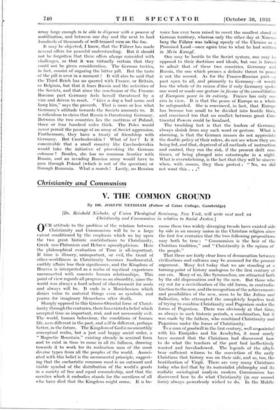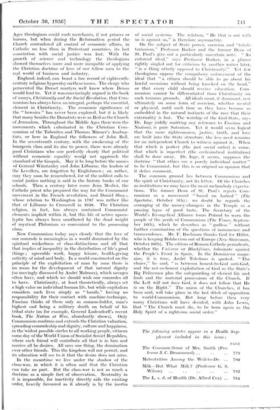V. THE COMMON GROUND
Christianity and Communism
By DR. JOSEPH NEEDHAM (Fellow of Caius College. Cambridge) [Dr. Reinhold Niebuhr, of Union Theological Seminary, New York, will write nail week on Christianity and Communism in relation to Social Justice.] OUR attitude to the problem of the relation between Christianity and Communism will be to a large extent conditioned by the emphasis which we lay upon the two great historic contributions to Christianity, Greek nco-Platonism and Hebrew apocalypticism. Here the philosophical evaluation of Time is all-important. If time is illusory, unimportant, or evil, the trend of other-worldliness -in Christianity becomes fundamental, earthly affairs lose their significance, and the Kingdom of Heaven is interpreted as a realm of mystical experience unconnected with concrete human relationships. This point of view regards all progress as an absurdity, since the world was always a hard school of chastisement for souls and always will be. It ends in a Manichaeism which denies value to material things even as symbols, and yearns for imaginary blessedness after death.
Sharply opposed to this Gracco-Oriental form of Christ- - ianity through the centuries, there has existed a belief which accepted time as important, real, and not necessarily evil. The world, human behaviour, the conditions of human life, were different in the past, and will be different, perhaps better, in the future. The Kingdom of God is no unearthly conceptual realm, but a just and happy social order, a " Magnetic Mountain," existing already in seminal form and to exist in time to come in all its fullness, drawing towards it to work for its realisation men of the most diverse types from all the peoples of the world. Associ- ated with this belief is the sacramental principle, suggest- ing that the eucharistic common meal is an outward and visible symbol of the distribution of the world's goods in a society of free and equal comradeship, and that the sacrifice which it embodies stands for the sacrifices of all who have died that the Kingdom might come. It is be- cause these two widely diverging trends have existed side by side in an uneasy union in the Christian religion since the first few centuries that the two following proposition may both be true : " Communism is the heir of the Christian tradition," and " Christianity is the opium of the people."
That there are fairly clear lines of demarcation between civilisations and cultures may be assumed for the present argument. Many feel today that we are standing at a turning-point of history analogous to the first century of our era. Many of us, like Symmachus, are attracted both by the old dispensation and by the new. But those who cry out for a revivification of the old forms, in contradis- tinction to the new, and the recognition of the achievements and possibilities of the new, seem to be like Julian and Sallustius, who attempted the completely hopeless task of trying to combine Christianity and Paganism under the forms of Paganism. There was obviously at that time, as always in such historic periods, a combination, but it was made by the fathers, who combined Christianity and Paganism under the forms of Christianity.
To a man of goodwill in the first century, well acquainted with his Euripides and his 'Aeschylus, it must surely have seemed that the Christians had -discovered how to do what the teachers of the past had ineffectively wanted and foreshadowed. The legends Of the sibyls bear sufficient witness to the conviction of the early Christians that history was on their side, and so, too, the beatification of Virgil. There are very .many Christians today, who feel that by its materialist philosophy and its 'realistic. sociological analysis modern . COmmunism has discoVered how to do what Christianity (in, our second fOrin) always powerlessly wished to do. In the Middle Ages theologians could curb merchants, if hot princes or barons, but when during the Reformation period the Church surrendered • all control of economic affairs, . in Catholie no less than in Protestant countries, its last association with social justice was lost: With the growth of science and technology the theologians Showed themselves more and more incapable of applying the Christian doctrine of love of our fellow men to the real world of business and industry.
England, indeed, can boast a fine record of eighteenth- century religious hypocrisy on these issues. The clergy who persecuted the Dorset martyrS well knew where' Deism would lead to. Yet it was convincingly argued inthe book of essayS, *Christianity and the Social Revolution, that Com- munism has alWays been an integral, perhaps the essential, clement in Christianity. The economic significance of the " hereSies " has never been explored, but it is likely that many beSides the Donatists were as Red as the Church of Jerusalem. Throughout the Middle Ages there were the movements which culminated in the Christian Com- mUnism of the Taborites and Thomas Mfinzer's Anabap- tists, or here in England the followers of John Ball. In the seventeenth century, with the awakening of the bourgeois class and its rise to power, there were already good Christians who saw perfectly clearly that political without economic equality wou141 not approach the standard of the Gospels. May it be long before the names of Gerrard Winstanley and John Lilburne, the.leaders of the Levellers, are forgotten by Englishmen ; or, rather, may they soon be remembered, for of the noblest calls to social justice nothing is said in the history books of our schools. Then a century later come Jean Meslier, the Catholic priest who prepared the way for the Communist movement in the French revolution, and Daniel Shay3, whose relation to Washington in 1787 was rather like that of Lilburne to Cromwell in 1648. The Christian religion, in fact, has always contained Communist elements implicit within it, but this life of active apoca- lyptic has always been smothered by the dead weight of mystical Platonism so convenient to the possessing class.
Now Communism today says clearly that the love of our comrade is meaningless in a world dominated by the spiritual wickedness of class-distinctions and all that that implies of inequality in the distribution of life's good things ; agreeable work, happy leisure, health-giving activity of mind and body. In a world constructed on the principle of the exploitation of man by man there is no room for the development of that natural dignity (so movingly discussed by Andre Malraux), which savages often have, and which we should wish our comrades all to have. Christianity, at least theoretically, always set a high value on individual human life, but while capitalism considers such lives simply as " hands," having no responsibility for their contact with machine-technique, Fascism thinks of them only as cannon-fodder, man's highest end being a military death on behalf of his tribal state (as for example, General Ludendorff's recent book, The Nation at War, abundantly shows). Only Communism confirms and extends the Christian valuation, spreading comradeship and dignity, culture and happiness, in the'widest possible circles to all working people, citizens some day of the World Union of Socialist Soviet Republics, where each friend will contribute all that is in him and receive all he desires. All save one thing, the domination over other friends. This the kingdom will not permit, and its education will sec to it that the desire does not arise.
In the meantime we live under the shadow of the class-war, in which it is often said that the Christian can take no part. But the class-war is not so much a doctrine as a simple fact of observation. Neutrality in it is impossible, for inactivity directly aids the existing order, heavily favoured as it already is by the inertia of social systems. The relation, " Ile that is not with us is against us," is therefore asymmetric.
On the subject of State power, coercion and "totali- tarianism," Professor Barker and the former Dean of St. Paul's give out a particularly uncertain note. " An enforced ideal," says Professor Barker, in a phrase rightly singled out for criticism by another writer later, " is a thing utterly opposed to Christianity:" Yet few theologians oppose the compulsory enforcement of the ideal that " a citizen should be able to go about his lawful occasions without being knocked on the head." or that every child should receive education. Com- munism cannot be differentiated from Christianity on such tenuous grounds. All ideals must, if doMinant, rest ultimately on some form of coercion, whether mental or physical, until such time as they have become so embedded in the natural instincts of .the race that their externality is lost. The worship of the God-State, says Dr. Inge (oddly omitting any reference to Fascism and Nazism). is pure Satanism. Yet it would seem logical that the more righteousness, justice, truth, and love are built into the State structure, the less need remains for an independent Church to witness against it. IV hen that which is perfect (the just social order) is come, that which is imperfect (the ecclesiastical institution) shall be done away. Dr. Inge, it seems, supposes the doctrine " that ethics are a purely individual matter" to be Communist, but this is so original an opinion that it defies comment.
The common ground lies between Communism and the spirit of Christianity, not its letter. Of the Churches as institutions we may have the most melancholy expecta- tions. The former Dean of St. Paul's rejects Com- munism as a movement " based on hatred " (The Spectator, October 9th) ; no doubt he regards the scourging of the money-changers in the Temple as a passing lapse of good taste. The Secretary of the World's Evangelical Alliance tours Poland to warn the people of the perils of Communism (The 7'imes, Septem- ber 16th), which he describes as " godless " without further examination of the questions of immanence and transcendence. Mr. F. Buchanan thanks God for Hitler, who is keeping Bolshevism out of Europe (New Statesman, October 10th). The editors of Roman Catholic periodicals, whether the Universe or Blackfriars, fulminate against the People's Front in Spain. In the Dominican maga- zine, it is true, Andre Toledano is quoted. " The choice," he said, " is between honest-to-God anti-God, and the not-so-honest exploitation of God as the State's Big Policeman plus the safeguarding of clerical life and limb and the material possessions of the Church. If the Left *ill not have God, it does not follow that He is on the Right." The union of the Churches, it has been said, will take place in the last ditch of opposition to world-Communism. But long before then very many Christians will have decided, with John Lewis, that " The Church must die, to be born again as the Holy Spirit of a righteous social order."





















































 Previous page
Previous page